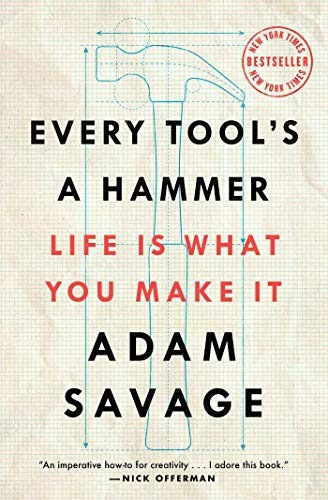4thace reviewed Every Tool's a Hammer by Adam Savage
Review of "Every Tool's a Hammer" on 'Goodreads'
4 stars
This book is intended for those who identify as makers, whether of art or of technology or of craft.
The people who should get the most out of this book are the ones who are trying to think about how they can bring the things they have in their minds into being and how they can how they can hang onto the critical momentum they need to complete their projects. His background is working for special effects houses and for the cinematic industry which is something very distant from my experience. He does mention some of the epic builds that happened on the Mythbusters television program that fans will recall. Some of those exploits happened not far from where I live now. But this book goes far beyond that by describing his life as a maker long before and after that program that made him famous. I can relate to it because I used to work with my hands quite a lot when I was an experimental physicist building experiments and later on when I was a small business owner repairing furniture. That was when I had my own tools and had a stock of materials with properties I needed to understand. Now I'm very detached from that state of mind that the author describes which includes single-minded devotion to the process of making the object, the proper maintenance of a workspace, and working with other makers.
He consistently comes across as a person who has always thrown himself into the work. The book is thematically organized with plenty of stories along the way. The parts that stick out in my mind are the sections on checklists and organizing projects by checking off boxes for each atomic step. He talks about tools and about materials organization working with others and a lot of it has to be in service to his cosplay passion. When he talks about the role of drawing in clarifying one's ideas and communicating them to others you can see that this is something that he finds really as a core part of his way of thinking. I liked learning about his idea of how you start out working with a cheap tool of a given type to learn whether it's for you and how to graduate to a more perfect version of the tool once you know that it is. He writes and speaks with an appealing humility, or, rather, tends to boast about about the artifacts that he's been to do justice to by applying the toolkit of a generalist to every challenge they posed. He owns up frequently to times where he didn't measure up and the lessons that he learned from those episodes. There are many reminiscences of manic energy in this book, but towards the end he takes on on a more reflective attitude to where he's been and what he's learned over the years. This philosophical section may be the most valuable take away from the book. A lot of the ideas he includes are credited to other makers he has gotten to know, whether craft people, skilled tradespeople, or trainees who have worked in one of his shops.
So I would say that I admire this book though it's not immediately applicable to my situation since I have no immediate desire to set up a shop. I can see it being life changing for other makers who have similar broad interests. He sees something transcendent in works of cinema that I find uninteresting. And that's okay. I think he's just more in tune with his senses, from the years of working a piece of material and fashioning it into something, compared to the more conceptual approach to projects that I favor.
I listened to this as an audiobook read by the author which also comes along with a PDF containing illustrations of the works he describes in loving detail. Of course his enthusiasm and deep knowledge shines all through this book.

